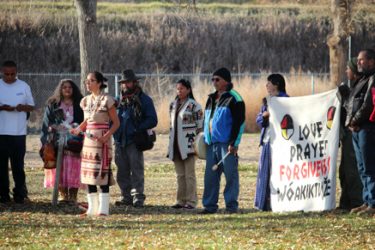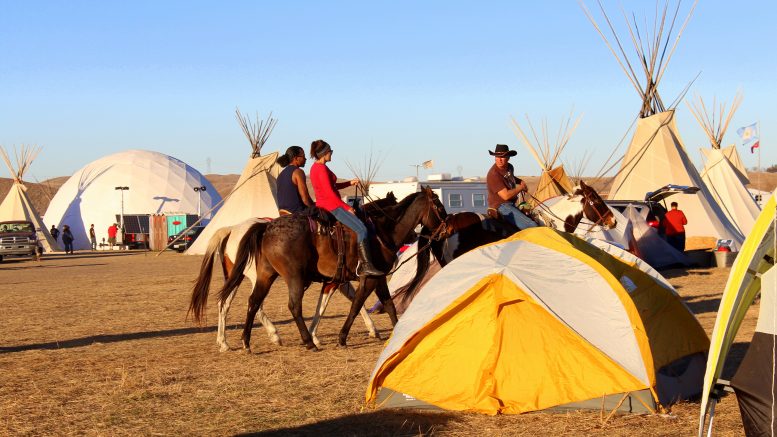University of Manitoba students are showing solidarity with North Dakota’s Standing Rock Sioux tribe in its months-long effort to block the construction of the Dakota Access Pipeline project.
The U of M Womyn’s Centre and the Justice for Women student group organized a fundraising bake sale last week and members of the University of Manitoba Aboriginal Students’ Association (UMASA) travelled south to the Oceti Sakowin camp in North Dakota earlier in November.
The Dakota Access project is a proposed 1,880 kilometre pipeline that will connect North Dakota oil projects with refineries in Illinois. If successfully completed, the pipeline will transport more than half a million barrels of oil a day through four states.
Indigenous activists began protesting the US $3.8 billion construction project in April, claiming the pipeline could contaminate the Missouri River, the water source for the Standing Rock reservation’s thousands of residents as well as millions of people that live downstream.
Amanda Fredlund, female vice president of UMASA, visited Standing Rock weeks ago and said the motivation was born out of the association’s initiative to support students wanting to go to the front lines of the protest.
“We had heard about Standing Rock and the protest and we really wanted to show our support and encourage the Indigenous student population to be part of this fight,” she said, noting that the organization is helping cover travel costs for students who are heading to North Dakota to participate.
Fredlund said the pipeline was initially designed to cross the river north of Bismarck, the capital of North Dakota, but was rerouted in part because of the potential threat it posed to the city’s water supply.
She said it is disappointing the same consideration is not given to Standing Rock.
Fredlund called on everyone – whether directly impacted or not – to join the fight against the pipeline’s construction.
“Being vocal is so important and I think that’s a huge inspiration that’s coming from North Dakota right now,” she said.
“Just because they are in a different country doesn’t mean that they aren’t our brothers and sisters.”
Fredlund added that the media is representing the protest as an issue that only affects Indigenous people.
“When you look at the water source affected, should there be a spill from that pipeline, the effects are astronomical,” she said. “This is not an Indigenous issue – it is a human issue.”
Jennifer Parisian, an organizer with the Justice for Women student group, said the support for Standing Rock stems from the group’s humanitarian efforts, which expand beyond strictly women’s issues.
“We do try to focus on women’s rights, but because we are trying to be more intersectional, Indigenous rights is something that we really try to focus on,” she said.
Parisian expressed disappointment in what she described as the U.S. government’s apathetic behaviour toward members of the Standing Rock Sioux tribe, noting the pipeline’s rerouting away from non-Indigenous communities to its current path.
“It’s been rerouted many times away from other communities that aren’t Indigenous, and this just shows who is important and who is not,” she said.
Dozens of protesters have been hospitalized and more than 300 injured in the last two weeks after policed turned water cannons, tear gas, and other non-lethal weapons against the unarmed activists.
“Just over the [Nov. 20-21] weekend, the police went in and sprayed the protesters with cold water, teargas, shot them with rubber bullets,” Parisian said.
“One woman even [may] have her arm amputated. And so the money that we are raising right now is to treat these medical problems, and improve sanitary conditions for the protesters.”
Parisian said the Justice for Women group is hoping to be sure no one who travels to North Dakota is without the essentials.
“A lot of people right now are coming to support them, but a lot of times, they don’t have the resources,” she said. “Many people don’t know what it will be like, so they don’t bring enough resources, which is where we come in.”
Fredlund said that when she was at the front lines of the protest, it was very peaceful and it is hard to imagine how things have deteriorated in the last few weeks.
“We participated in a peaceful prayer walk through Mandan, North Dakota, and there were no conflicts when we were there,” she said.
“It’s a little difficult to imagine that people are being shot with rubber bullets. The media is just really trying so hard to paint these warriors in a horrible light, which is just not true.”

Photo by Amanda Fredlund.
Violence notwithstanding, support for Standing Rock continues to grow.
Fredlund said that as a Canadian, she is elated by the show of support for the people of North Dakota.
“We’re Canadians helping Americans fight their fight, and it’s really exciting because it’s sparking that fire in a lot of young people today who maybe never felt connected to a certain fight,” she said.
“Seeing the people in North Dakota rallying support in protest of something that they don’t think is right kind of gives us inspiration.”
It inspires “our generation, especially in an academic setting, to stand up and say ‘we can do this,’” she said.
Parisian said she saw a strong showing of support at the fundraiser, noting several students stopped by to make direct donations toward the protest.
“There has been a lot of generosity,” she said. “A lot of people have been coming, just giving us $20 bills, even without buying anything. They just hear what the bake sale is for and are happy to donate.”
Fredlund also condemned the efforts of the company behind the project, Energy Transfer Partners, and similar companies, for attempting to build more pipelines rather than seek alternative energy sources.
“How much longer are we going to have oil?” she questioned. “Here we are contaminating our lands when really we should be finding alternate resources, or more sustainable ways of getting our energy and our fuels.”
Fredlund said she believes the protests have sparked an energy that will carry over north of the border.
“We have companies that are trying to build pipelines currently in Canada,” she said, “and I think that seeing the fire that has been created in North Dakota – that spirit, resilience, and wanting to make change – is really encouraging people in Canada to do the same.”





